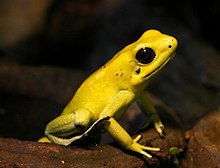Golden dart frog
The golden dart frog (Phyllobates terribilis) is a poison dart frog. It lives in the Pacific coast of Colombia.
| Phyllobates terribilis | |
|---|---|

| |
| Scientific classification | |
| Kingdom: | |
| Phylum: | |
| Class: | |
| Order: | |
| Family: | |
| Genus: | |
| Species: | P. terribilis
|
| Binomial name | |
| Phyllobates terribilis | |
In captivity, poison dart frogs are not poisonous. It is in the wild where they are poisonous because of what they eat. This amphibian of the Dendrobatidae family is considered the most poisonous vertebrate in the world.[1] The optimal habitat of P. terribilis is the rainforest with high rain rates (5 m. or more), altitude between 100-200 m, temperature of 26 °C, and relative humidity of 80-90%.
- "In a 20-gram white mouse, the minimal lethal dose of batrachotoxin/homobatrachotoxin is about 0.05 µg, when injected subcutaneously. Thus, one frog, P. terribilis, with typical 1100 µg of these compounds, contains enough poison to kill more than 20,000 mice. Although extrapolating toxicity parameters from mouse to man has errors, if we suppose that man is at least as susceptible as mice to these compounds, the lethal dose is about 180 µg for a person. Larger animals are often more susceptible to toxins that smaller organisms, so that the lethal dose for man may be even less. Myers et al. [1] anticipated a lethal dose of batrachotoxin for man of only 2.0 to 7.5 µg, when administered by injection.
- "The oral potency of batrachotoxin is much lower; therefore, Indians can eat animals captured by their darts without of risk of intoxication. In additions, the small amount of poison used is metabolized and the metabolites are not poisonous; most importantly, cooking may also destroy the toxins, although not all toxins are heat labile".[2]
The high toxicity of P. terribilis may be due to eating small insects or other arthropods, and one of these may truly be the most poisonous creature on Earth. Scientists have suggested the crucial insect may be a small beetle from the family Melyridae. At least one species of these beetles produces the same toxin found in P. terribilis. Their relatives in Colombian rainforests could be the source of the batrachotoxins found in the highly toxic Phyllobates frogs of that region.[3]
References
change- ↑ "Atlas Dr. Pez :: Phyllobates terribilis". Archived from the original on 2007-12-13. Retrieved 2008-11-07.
- ↑ Dart poison frogs and their toxins The ASA Newsletter 1999
- ↑ Cotton, Simon: Batrachotoxin ...or, just touch me and you're dead [1]
